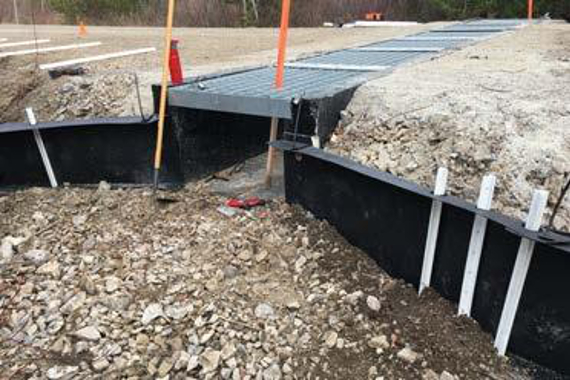
Student volunteers assist Parks Canada staff with installing roadside deflection fencing to direct wildlife toward the ecopassages. Photo: © Laura Sagermann
The road to recovery
Wildlife ecopassages in Bruce Peninsula National ParkFootnote *
What’s the issue?
 An ecopassage and deflection fencing designed to reduce reptile and amphibian roadkill. Photo: © Tricia Stinnissen
An ecopassage and deflection fencing designed to reduce reptile and amphibian roadkill. Photo: © Tricia StinnissenWhen frogs, salamanders, turtles and snakes try crossing busy roads, they often don’t make it to the other side. Small and slow-moving, they’re especially vulnerable to becoming roadkill – a common problem where these creatures move between habitats like wetlands and nesting grounds. Traffic mortality is a leading cause of decline for reptile and amphibian populations. Bruce Peninsula National Park is determined to solve the problem by identifying movement hotspots and building ecopassage underpasses for wildlife – including endangered snapping turtles and Massasauga rattlesnakes. Eliminating gruesome hotspots will help restore critical populations and conserve the diversity of wildlife on the Bruce Peninsula.
What’s our approach?
- Install deflection fencing to direct wildlife toward ecopassages and improve their effectiveness at reducing roadkill.
- Design and install improved ecopassages and deflection fencing at newly identified roadkill hotspots.
- Create artificial nest habitat in strategic locations to reduce the need for females (and hatchlings) to cross roads and risk injury or mortality.
- Design and initiate a monitoring protocol to evaluate the effectiveness of deflection fencing and ecopassages.
- Seek volunteers to help with restoration work and develop a citizen science turtle monitoring program to foster a connection among local residents and visitors.
- Educate visitors and local residents about the Massasauga rattlesnake to change perceptions, reduce persecution and enhance stewardship.
What’s been accomplished?
- Engaged student volunteers from the local Outers Club to help install deflection fencing at hotspots along Dorcas Bay Road.
- Installed more than 1 km of deflection fencing on either side of five existing ecopassages and prepared designs for two new, larger ecopassages at roadkill hotspots.
- Completed four artificial nesting sites for turtles, and developed plans for four more to be installed in 2018.
- Developed a citizen science turtle monitoring program for launch in 2018.
- Connected with Canadians using social media and the internet to share information about road ecology, ecopassages, artificial turtle nests and hatchling turtles.
- Date modified :